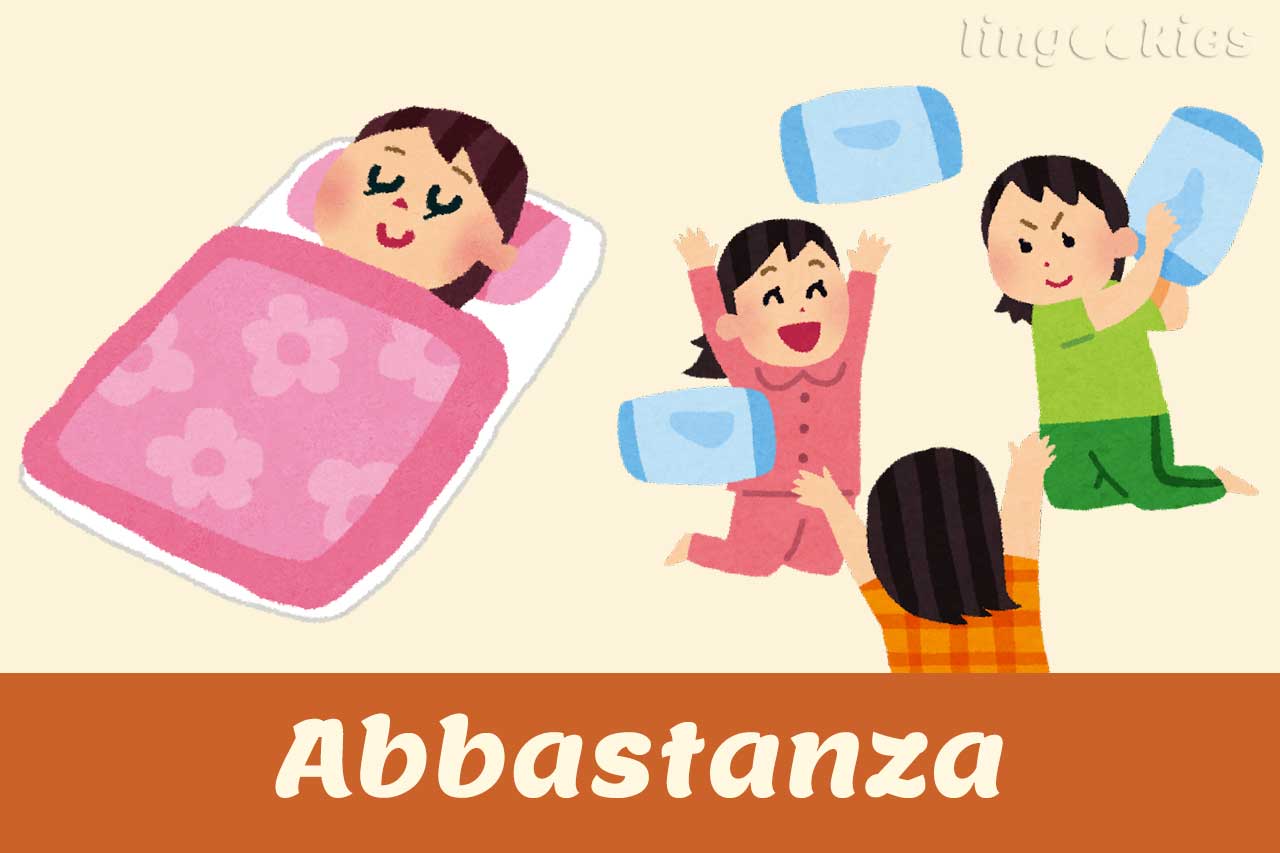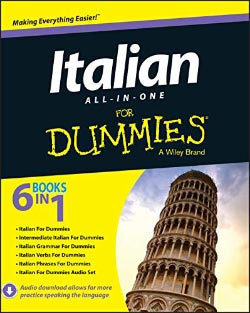What is abbastanza in Italian? How do you pronounce it? How do you translate it into English?
In this lesson, we will look at how to use this word with the help of many audio recordings and example sentences. Read on to learn everything you need to know.
Let’s get started! Iniziamo!
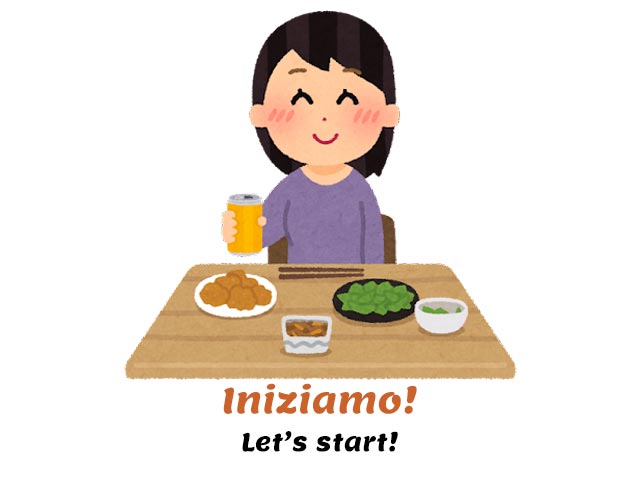
How to use abbastanza in Italian
Meaning of abbastanza in Italian
Abbastanza is both an adverb and an adjective. It translates into English as enough and quite/pretty.
First of all, let’s hear how abbastanza is pronounced.
Abbastanza
Enough
Its pronunciation is close to ub-bus-stun-tsah. If you have trouble pronouncing Italian sounds, check out the Italian pronunciation guide.
Now, let’s see some example sentences with abbastanza in Italian, before we look at how to use this word.
Title: Italian All-in-One For Dummies
Language: English / Italian
Publisher: For Dummies
Pages: 672
Learn to speak Italian like a native? Easy.
Italian All-in-One For Dummies appeals to those readers looking for a comprehensive, all-encompassing guide to mastering the Italian language. It contains content from all For Dummies Italian language instruction titles, including Italian For Dummies, Intermediate Italian For Dummies, Italian Verbs For Dummies, Italian Phrases For Dummies, Italian Grammar For Dummies, and Italian For Dummies Audio Set.
Hai dormito abbastanza stanotte?
Did you have enough sleep last night?
Literally: Did you sleep enough last night?
Non avete ancora mangiato abbastanza? Siete dei pozzi senza fondo!
Haven’t you had enough to eat yet? You are bottomless pits!
Literally: Haven’t you eaten enough already?
Avrai abbastanza forza per alzare questo masso?
Will you have enough strength to lift this boulder?
Questo vestito è abbastanza caro. Non credo di potermelo permettere.
This dress is quite expensive. I don’t think I can afford it.
Non ho abbastanza olio per friggere.
I don’t have enough frying oil.
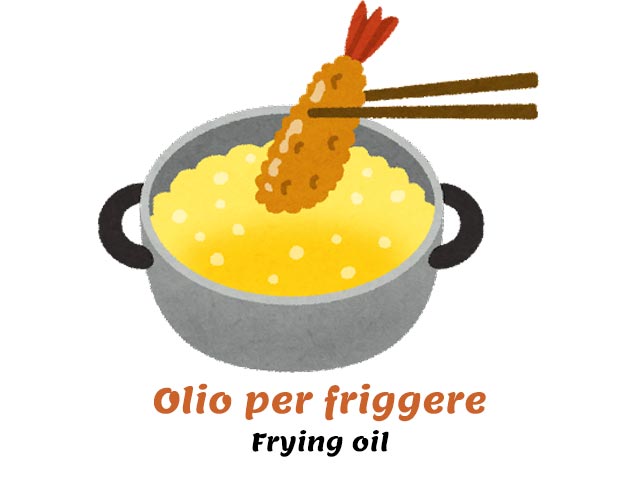
Now let’s see how to use abbastanza.
Use of abbastanza in Italian
As an adverb, abbastanza modifies a verb.
Hai riposato abbastanza?
Have you rested enough?
Non ho mangiato abbastanza. Ho ancora fame.
I haven’t eaten enough. I’m still hungry.
As an adjective, it modifies a noun or another adjective. It always translates as enough.
Sei abbastanza alto per prendere il barattolo su quello scaffale?
Are you tall enough to get the jar on that shelf?
Non ci sono abbastanza uova in frigo.
There are not enough eggs in the fridge.
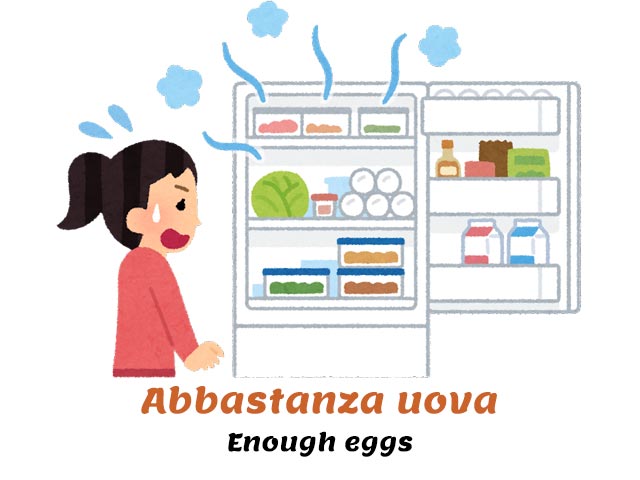
It’s interesting to note that, unlike regular Italian adjectives, abbastanza in Italian doesn’t have to match the word in both gender and number. It has only one form.
| Singular | Plural | |
| Masculine | Abbastanza | Abbastanza |
| Feminine | Abbastanza | Abbastanza |
So it doesn’t matter if you’re talking about a singular or a plural noun.
Abbastanza… sale, pagine, farina, sedie.
Enough… salt, pages, flour, chairs.
Abbastanza in Italian can also act as a quantifier, meaning “quite” or “pretty”.
Dario mi sta abbastanza simpatico.
I quite like Dario.
Bisogna studiare molto per imparare l’italiano? – Sì, abbastanza.
Do you have to study a lot to learn Italian? – Yes, quite a lot.
La zuppa è abbastanza buona.
The soup is pretty good.

That’s enough!
Averne abbastanza is a popular expression in Italian that translates as to have enough.
Ne ho abbastanza di questa discussione! Me ne vado!
I’ve had enough of this debate! I’m out of here!
Ne ho abbastanza di te!
I’ve had enough of you!
And that’s the end of our lesson on the meaning of abbastanza in Italian!
What next?
Now that you’ve seen how to use abbastanza in Italian, you might want to keep learning Italian online with these free Italian resources:
❤️ If you liked this lesson on the meaning of abbastanza in Italian, consider sharing it with your social media friends who are also studying Italian.

